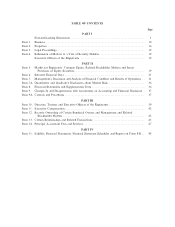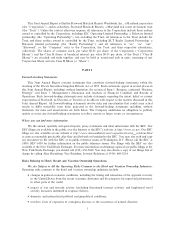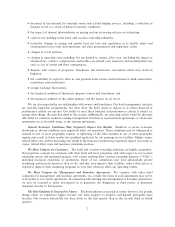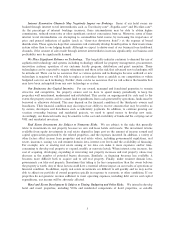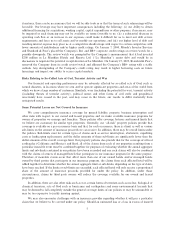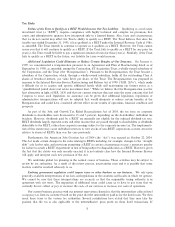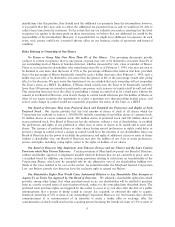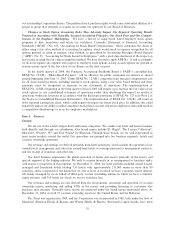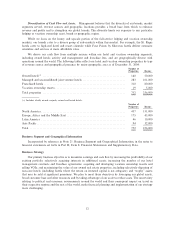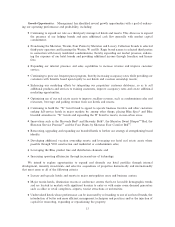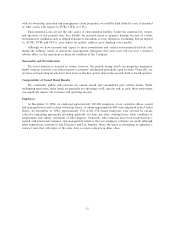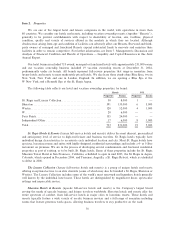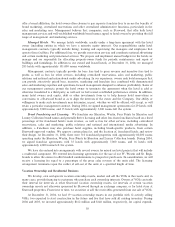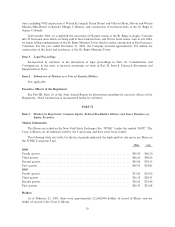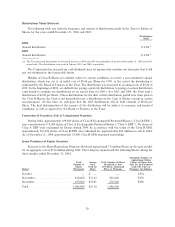Starwood 2004 Annual Report Download - page 18
Download and view the complete annual report
Please find page 18 of the 2004 Starwood annual report below. You can navigate through the pages in the report by either clicking on the pages listed below, or by using the keyword search tool below to find specific information within the annual report.our outstanding Corporation Shares. The preferred stock purchase rights would cause substantial dilution to a
person or group that attempts to acquire us on terms not approved by our Board of Directors.
Changes in Stock Option Accounting Rules May Adversely Impact Our Reported Operating Results
Prepared in Accordance with Generally Accepted Accounting Principles, Our Stock Price and Our Competi-
tiveness in the Employee Marketplace. We have a history of using broad based employee stock option
programs to hire, incentivize and retain our workforce. Currently, Statement of Financial Accounting
Standards (""SFAS'') No. 123, ""Accounting for Stock-Based Compensation,'' allows companies the choice of
either using a fair value method of accounting for options, which would result in expense recognition for all
options granted, or using an intrinsic value method, as prescribed by Accounting Principles Board Opinion
(""APB'') No. 25, ""Accounting for Stock Issued to Employees,'' with a pro forma disclosure of the impact on
net income of using the fair value recognition method. We have elected to apply APB No. 25 and accordingly,
we do not recognize any expense with respect to employee stock options as long as such options are granted at
exercise prices equal to the fair value of our Shares on the date of grant.
In the fourth quarter of 2004, the Financial Accounting Standards Board (""FASB'') concluded that
SFAS No. 123(R), ""Share-Based Payment,'' will be eÅective for public companies for interim or annual
periods beginning after June 15, 2005. Under SFAS No. 123(R), companies must measure compensation cost
for all share-based payments, including employee stock options, using a fair value based method and these
payments must be recognized as expenses in our statements of operations. The implementation of
SFAS No. 123(R) beginning in the third quarter of Ñscal 2005 will require us to expense the fair value of our
stock options in our consolidated statement of operations rather than disclosing the impact on results of
operations within our footnotes in accordance with the disclosure provisions of SFAS No. 123 (see Note 2 of
the Notes to Consolidated Financial Statements). The implementation of SFAS No. 123(R) will result in
lower reported earnings per share, which could negatively impact our future stock price. In addition, this could
negatively impact our ability to utilize employee stock plans to recruit and retain employees and could result in
a competitive disadvantage to us in the employee marketplace.
Item 1. Business.
General
We are one of the world's largest hotel and leisure companies. We conduct our hotel and leisure business
both directly and through our subsidiaries. Our brand names include St. Regis», The Luxury Collection»,
Sheraton», Westin», W» and Four Points» by Sheraton. Through these brands, we are well represented in
most major markets around the world. Our operations are grouped into two business segments, hotels and
vacation ownership operations.
Our revenue and earnings are derived primarily from hotel operations, which include the operation of our
owned hotels; management and other fees earned from hotels we manage pursuant to management contracts;
and the receipt of franchise and other fees.
Our hotel business emphasizes the global operation of hotels and resorts primarily in the luxury and
upscale segment of the lodging industry. We seek to acquire interests in, or management or franchise rights
with respect to properties in this segment. At December 31, 2004, our hotel portfolio included owned, leased,
managed and franchised hotels totaling 733 hotels with approximately 231,000 rooms in more than 80
countries, and is comprised of 140 hotels that we own or lease or in which we have a majority equity interest,
283 hotels managed by us on behalf of third-party owners (including entities in which we have a minority
equity interest) and 310 hotels for which we receive franchise fees.
Our revenues and earnings are also derived from the development, ownership and operation of vacation
ownership resorts, marketing and selling VOIs in the resorts and providing Ñnancing to customers who
purchase such interests. Generally these resorts are marketed under the brand names mentioned above. At
December 31, 2004, we had 19 vacation ownership resorts in the United States and the Bahamas.
The Trust was organized in 1969, and the Corporation was incorporated in 1980, both under the laws of
Maryland. Sheraton Hotels & Resorts and Westin Hotels & Resorts, Starwood's largest brands, have been
10


